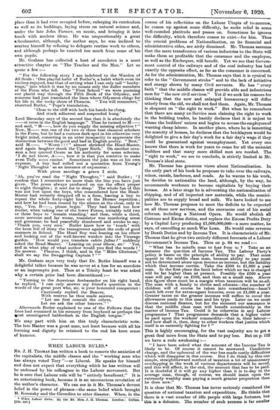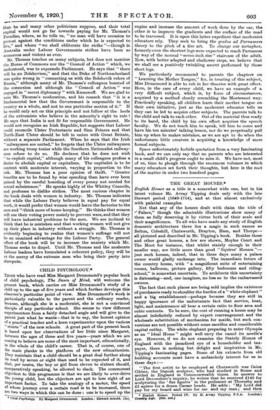WHEN LABOUR RULES.*
MR. J. H. Thomas has written a book to remove the anxieties of the capitalists, the middle classes and the "working man who has always voted Tory "—or Liberal. He speaks for himself and does not expect that everything which he has written will be endorsed by his colleagues in the Labour movement. But he is sure that Labour rule will be "entirely beneficent." It is an entertaining book, because it is SR unconscious revelation of the author's character. We can see in it Mr. Thomas's devout belief in the power of phrases—the same belief which brought M. Kerenaky and the Girondins to utter disaster. When, in the • When Labour Rules. in the Rt. II. Thomas. London : Collins. Dot. net.] course of his reflections on the Labour Utopia of to-morrow, he comes up against some difficulty, he seeks relief in some well-rounded platitude and passes on. Sometimes he ignores the difficulty, which therefore ceases to exist—for him. Thus the crucial problems of Nationalization, on its financial and administrative sides, are airily dismissed. Mr. Thomas assumes that the mere transference of various industries to the State will make them so profitable that the consumer and the employee, as well as the Exchequer, will benefit. Yet we see that Govern- ment control of the railways and of the coal industry has had exactly the opposite effect, as far as the consumer is concerned. As for the administration, Mr. Thomas says that it is cynical to refer to the "Government stroke" and to the lack of initiative and energy shown by many Civil servants. He has "every faith" that the middle classes will provide able and industrious men for "the new civil services." Yet if we seek his reasons for thinking that the new and enlarged bureaucracy will differ Utterly from the old, we shall not find them. Again, Mr. Thomas is eloquent on "the right to work." But when he remembers that there are many ex-Service men claiming tho right to work in the building trades, he hastily declares that it is unjust to blame the builders' unions and begins to accuse the employers of wanting cheap labour. In another place, where he is lamenting the scarcity of houses, he declares that the bricklayers would be delighted to give a fair day's work for a fair day's wage if they could be guaranteed against unemployment. Yet every one knows that there is work for years to come for all the unionist builders and that many more skilled men are needed. The "right to work," we are to conclude, is strictly limited in Mr. Thomas's ideal state.
Mr. Thomas has generous views about Nationalization. In the early part of his book he proposes to take over the railways, mines, canals, harbours, and roads. As he warms to his work, he decides to nationalize the land, although, by the way, he recommends workmen to become capitalists by buying their houses. At a later stage he is advocating the nationalization of shipping, and of all imported raw materials, while the munici- palities are to supply bread and milk. We have looked to see how Mr. Thomas proposes to meet the deficits to be expected on all these new services, and the enormous cost of his social reforms, including a National Opera. He would abolish all Customs and Excise duties, and replace the Excess Profits Duty by a Capital Levy producing LI,000,000,000—a mere matter, he says, of cancelling so much War Loan. He would raise revenue by Death Duties and by Income Tax. It is characteristic of Mr. Thomas that he gives two entirely different forecasts of a Labour Government's Income Tax. Thus on p. 64 we read :—
" What has he miadle man to heir bolt ? Take as an instance the queztion of Income Tax. The Labour Party's policy is basso on the principle of ability to pay. That must appeal to the middle class man, because ability to pay must not be determined alone upon income as income, but the liability which that income carries. Take the £500 to £1,000 a year man. In the first place the limit below which no tax is charged will be far higher than at present. Possibly the 5,500 a year man will pay only on £100, and then at a small rate. Above this figure there must be a margin when taxation will be moll. The man with a family to clothe and educate—the number of children will of course be taken into consideration —hasn't much left over for extravagant luxuries, even on £1,000 a year. Greater taxes on the greater incomes will suffice to cover the allowances made to this man and his type. Later on we must discuss national finance, but for the moment our assurance is that the middle class man will benefit considerably in the matter of Income Tax. Could it be otherwise in any Labour programme ? That programme demands that a higher value be paid upon the workers' commodity—that is, their labour— and how shall it, then, deny to other workers that justice which
itself is so earnestly fighting for ? "
This is highly encouraging, for the vast majority are to get a great deal more from the State and to pay less. But on p. 152 we have a rude awakening :—
" I have been asked what the amount of the Income Tax is likely to be. Of course it cannot be answered. Conditioos change, and the upheaval of the war has made costly difficulties which will disappear in due course. But I do think by this one simple, straightforward method of taxation a lot of unnecessary overlapping in the work of various departments will be saved, and this will affect, in the end, the amount that has to be paid. Itis doubtful if it will go any higher than it is to-day to the average man, though, of course, we should insist upon the extremely wealthy man paying a much greater proportion than he does now."
It is clear that Mr. Thomas has never seriously considered the question of national taxation and expenditure. He thinks that there is a vast number of idle people with large fortunes, but this is a delusion. The number of such persons is far smaller
than he and many other politicians suppose, and their total capital would not go far towards paying for Mr. Thomas's paradise, where, as he tells us, "no man will have occasion to protest against the conditions under which he is expected to Bee," and where "we shall obliterate the strike "—though in Australia under Labour Governments strikes have been as numerous and violent as ever.
Thomas touches on many subjects, but does not mention the House of Commons nor the "Council of Action" which, we understood, was to supersede Parliament. He says that "there will be no Bolshevism," and that the Duke of Northumberland was quite wrong in "connecting Us with the Bolshevik rulers of Russia," although many of Mr. Thomas's colleagues boasted of the connexion and although the "Council of Action" was engaged in "secret diplomacy" with Kameneff. We are glad to note Mr. Thomas's moderation, and his remark that "it is a fundamental law that the Government is responsible to the country as a whole, and not to one particular section of it." If he would only act on this principle and not follow at the heels of the extremists who believe in the minority's right to rule ! He says that India is not fit for responsible Government. He would not recognize an Irish Republic, but suggests that Labour could reconcile Ulster Protestants and Sinn Feiners and that North-East Ulster should be left in union with Great Britain, without a separate Parliament. When he says that the Irish "railwaymen are united," he forgets that the Ulster railwaymen are working troop trains while the Southern Nationalist railway- men refuse to do so. He declares that he does not wish to exploit capital," although many of his colleagues profess a desire to abolish capital or capitalism. The capitalist is to be content with moderate interest, varying in proportion to the risk. Mr. Thomas has a poor opinion of thrift. "Greater benefits are to be found by wise spending than have ever been gained by• the careful hoarding of every penny not needed for actual subsistence." He speaks highly of the Whitley Councils, and professes to dislike strikes. The most curious chapter in the book deals with women in industry. Mr. Thomas indicates that while the Labour Party believes in equal pay for equal work, it would prefer that women would leave the factories to the men and "-think more of home-keeping." He thinks that women will use their voting power mainly to prevent wars, and that they will leave industrial problems to the men. We are inclined to think that he is mistaken and that working women will not give up their place in industry without a struggle. Mr. Thomas is evidently beginning to realize that women's suffrage will not be an unmixed advantage for the Labour Party. The general effect of the book will be to increase the anxiety which Mr. Thomas seeks to dispel. Until Mr. Thomas and the moderate Labour leaders have formulated a coherent policy, they will be pt the mercy of the extreme men who bring their party into disrepute.







































 Previous page
Previous page